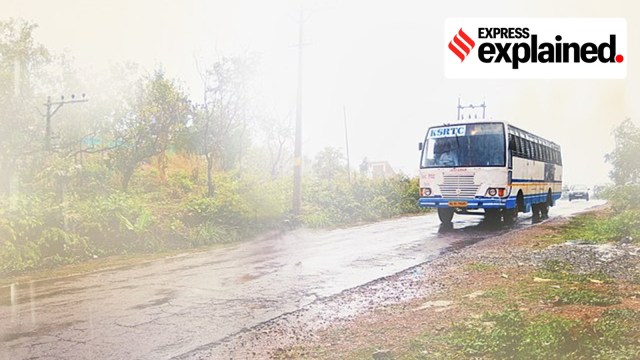Why the Kerala transport body has challenged Centre’s new permit rules for tourist vehicles
Here is a look at how a new permit rule under the Union law could change the transport industry, and why Kerala is opposing it.
 Tourist buses in Kerala operate under the Contract Carriage permit. (Photo: Wikimedia Commons)
Tourist buses in Kerala operate under the Contract Carriage permit. (Photo: Wikimedia Commons)The state-owned Kerala State Road Transport Corporation (KSRTC) has moved the High Court, challenging the legal validity of the Centre’s All India Tourist Vehicles (Permit) Rules, 2023, which came into effect from May this year. On November 29, the Kerala State Transport Authority cancelled an All-India Tourist Permit (AITP) invoking powers vested with it under the Motor Vehicle Act, 1988.
Here is a look at how a new permit rule under the Union law could change the transport industry, and why Kerala is opposing it.
Contract carriage and stage carriage
In Kerala, bus permits are granted by the respective Regional Transport Authorities in various districts, under Section 72 of the Motor Vehicles Act, 1988. The Act provides for two types of permits for buses — contract carriage and stage carriage.
A contract carriage is a vehicle/bus hired by a passenger or groups of passengers to go from one point to another, regardless of the route, and without stopping to pick up or drop off passengers along the way. Tourist buses in Kerala mainly operate under this permit.
On the other hand, a stage carriage bus runs on a specific route with the fare fixed by the government. A stage carriage runs as a regular bus service, where the entire route is broken into various specified stages till the destination point. KSRTC comes under the state carriage category.
All India Tourist Permit
The central government earlier this year framed the All India Tourist Vehicles (Permit) Rules, 2023. This all-India permit enables a tourist vehicle operator to ply throughout the country on the strength of a permit fee paid under Rule 5. This fee would be distributed among the states and the Union Government under a sharing formula.
Kerala is opposed to this All-India permit, though it is also a beneficiary of this fee-sharing formula.
Earlier, tourist bus permits under Motor Vehicles (All India Permit for Tourist Transport Operators) Rules, 1993. The 2023 Rules have simplified the granting of the permit, and by obtaining a permit from one state, the operator can use their vehicle throughout India.
The issue
As per the rule 6 (2) of permit regulations 2023, an operator with AITP can enter into individual contracts with passengers and therefore can pick and drop them at different points en route. This in a way allows a tourist permit holder to operate like a stage carriage, whereas in Kerala, tourist vehicles operate as contract carriages. The changed system can eat into the revenue of state carriages.
Kerala’s arguments
The state government has challenged the rules that allow a tourist vehicle to work as a state carriage, stating that they go against the provisions of the Motor Vehicles Act, 1988 and several Supreme Court verdicts. It has demanded that these rules be struck down.
The flashpoint
Many tourist vehicle operators have obtained the All-India Tourist Permit after the central law came into effect. But the issue heated up in Kerala after a bus operator named Robin Gireesh, with AITP, started operating an inter-state bus from Pathanamthitta to Coimbatore, with many stops enroute. The service was received well by passengers, but KSRTC, which has dominance in the inter-state sector, objected to it.
The Motor Vehicles Department (MVD) stepped in, slapping fines on the bus in many cities. The Tamil Nadu MVD also imposed a fine on the Robin bus, and its owner alleged this was at the behest of Kerala. The bus owner continued the service for a few more days, triggering debate over the new permit norms. The MVD suspended its permit on November 29. The operator then moved the HC, with KSRTC impleaded in the case. The court has orally raised doubts about challenging the new permit rules.
The worry for Kerala
Kerala’s problem is that if private operators with AITPs start operating like a regular bus service, it would hit the revenue of the state transport entity, already running under huge losses.
The ailing KSRTC depends upon revenue from long-distance intra-state and inter-state service to fill its fast-shrinking coffers. The state government in the last two-and-a-half years has paid Rs 4,833 crore for the KSRTC to meet its salary and pension bills. The state has banned private operators from several routes in Kerala, under the norms of nationalisation, to help the KSRTC, but at the cost of passenger facilities. AITP-holders, with brand new vehicles, have no legal hindrance to operate on the nationalised routes.
Why KSRTC is in dire straits
Kerala’s public transport system has been shrinking over the years, due to lack of modernisation of the KSRTC network and the increasing number of private vehicles in the state.
A national family health survey (NFHS-5) in 2022 had found that about one in four families in the state have a car, while the national average is only 7.5 per cent. The figure of private stage carriers has come down to 8,000 from 20,000 a decade back. Meanwhile the KSRTC, which has 5000-odd buses, is operating less than 4,000 buses due to its financial crisis.
- 01
- 02
- 03
- 04
- 05






































